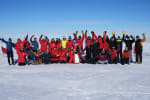Since November of last year, a team of IceCube engineers and scientists have been hard at work during the second of three consecutive field seasons for the IceCube Upgrade. Over the course of the season, 37 team members, including 27 drill engineers and 10 installation and operations experts, were deployed to the U.S. National Science […]
WIPAC
WIPAC news that we’re hiding.
IceCube observation of the cosmic-ray anisotropy in the Southern Hemisphere
Extremely energetic charged particles called cosmic rays are accelerated by violent cosmic objects before raining down on Earth from all directions. Protons and heavier nuclei make up these cosmic rays, which can then collide with other particles in the atmosphere to produce secondary particles that cascade into so-called “air showers.” For more than a century, […]
WIPAC agreement with Thai partners signals enthusiasm for future collaborations
This story was originally published by the University of Wisconsin–Madison International Division. Among the University of Wisconsin–Madison’s many ambitious research endeavors, the IceCube Neutrino Observatory stands out as one of the most unique. This remarkable telescope, which has instrumented a billion tons of South Pole ice, is designed to search for tiny, ghostlike particles called neutrinos, helping […]
Jim Madsen retires after 25 years with neutrinos
Jim Madsen, interim director of the Wisconsin IceCube Particle Astrophysics Center (WIPAC) at the University of Wisconsin–Madison and associate director for education and outreach for the IceCube Neutrino Observatory, recently announced that he was retiring after 25 years with IceCube and its predecessor AMANDA. His last day in the office was August 2. “With a […]
Carlos Argüelles-Delgado named a CIFAR Azrieli Global Scholar
This year, IceCube collaborator and Harvard University physics professor Carlos Argüelles-Delgado is among 10 emerging research leaders selected for the 2024-2026 cohort of the Canadian Institute for Advanced Research (CIFAR) Azrieli Global Scholars program, generously supported by the Azrieli Foundation. This ambitious next-generation initiative provides two years of unrestricted funding to talented researchers tackling important and […]
Sanjib Kumar Agarwalla receives prestigious 2021-2022 Rajib Goyal Prize
Sanjib Kumar Agarwalla was recently awarded the 2021-2022 Rajib Goyal Prize in Physical Sciences, which “honors Indian scientists who have made a mark in basic and applied sciences research.” The Goyal Prizes were instituted by the late philanthropist Ram S. Goyal to honor Indian scientists and social activists working towards the service of India. Agarwalla […]
Improving in-ice particle shower models for reconstruction of IceCube events
The IceCube neutrino detector, embedded in a cubic kilometer of Antarctic ice, searches for high-energy neutrinos from the farthest reaches of outer space. The pristine ice serves as a natural medium for detecting showers of secondary charged particles that result from many neutrino interaction types in the ice. Through a process called Cherenkov radiation, ultraviolet […]
Ibrahim Safa awarded 2023 GNN Dissertation Prize
The 2023 Global Neutrino Network (GNN) Dissertation Prize is awarded to Ibrahim Safa, a postdoctoral research scientist at Nevis Labs of Columbia University. “The GNN dissertation prize recognizes young postdoctoral candidates who have written an outstanding thesis and contributed significantly to the project. Primary criteria of the selection are the scientific quality, the didactics and […]
Carlos Argüelles-Delgado named a 2024 Cottrell Scholar
IceCube collaborator and Harvard University physics professor Carlos Argüelles-Delgado is among 19 outstanding teacher-scholars in chemistry, physics, and astronomy named recipients of the Research Corporation for Science Advancement’s 2024 Cottrell Scholar Awards. Each awardee receives $120,000. Recipients are chosen through a rigorous peer-review process of applications from a wide variety of public and private research […]
First field season for IceCube Upgrade ongoing at the South Pole
Over the past two months, a team of IceCube drill engineers have completed an impressive amount of work during the first of three consecutive field seasons for the IceCube Upgrade. The project is funded by the National Science Foundation and international collaborators. The goal of the project is to drill seven holes in 2025/2026 and […]









